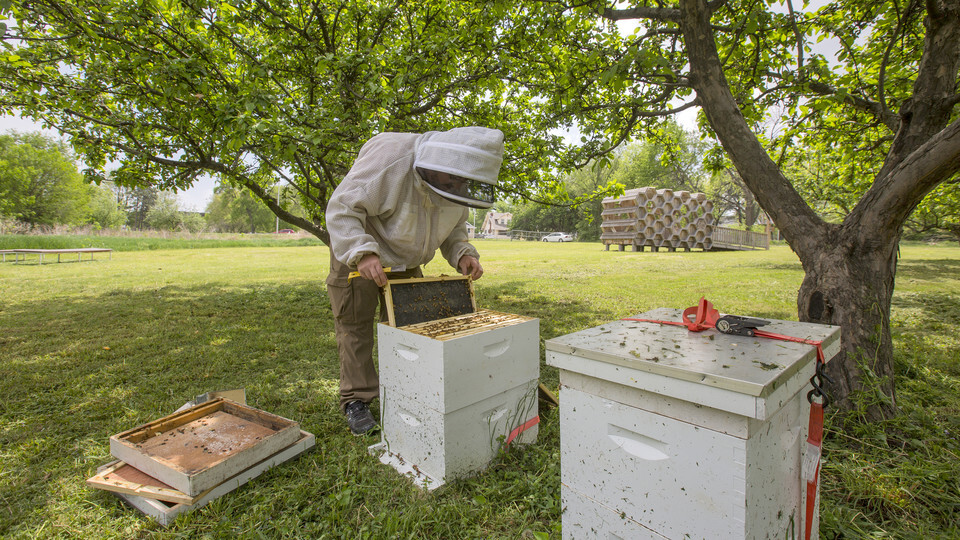
May 18, 2015
Lincoln, Neb. — There’s a sweet buzz brewing in the University of Nebraska–Lincoln’s Bee Lab.
Led by Judy Wu-Smart, assistant professor of entomology, the East Campus lab conducts research, organizes outreach and education events, and monitors hives statewide in pursuit of its mission to increase bee populations in Nebraska.
This season, the lab will lead seven distinct research projects studying honey and native bees; conduct statewide bee health surveys through a U.S. Department of Agriculture contract; extend ongoing solitary bee species surveys into the Sandhills; hold beekeeping and queen rearing workshops; increase its number of active hives from 40 to more than 200; take part in multiple outreach events in schools and summer camps, including a Lincoln Parks and Recreation “Pollinators on the Plaza” event on June 20; actively market its honey at events and through local businesses; and partner with Zipline Brewing for a Lincoln Beer Week event on May 26.
“This is the Bee Lab’s busiest season since the retirement of Marion Ellis (entomology professor and former leader of the Bee Lab) in 2013,” said Dustin Scholl, apiary manager. “We’re pretty excited to be up and running at full speed again, helping advance public understanding and research into bees, honey production and beekeepers’ success.”
Along with Wu-Smart and Scholl, the Bee Lab team includes six graduate students, four undergraduates (two of which are earning research experience through the university’s UCARE program) and two full-time lab technicians.
In the field, the team is leading a series of studies on how planting designs can better support pollinators. These include working with the Nebraska Department of Roads to design best management practices for roadside plantings; outlining land management practices that promote healthy pollinator populations in prairies; and identifying flowering plants that grow well and provide benefits for bees in urban landscapes.
Other Bee Lab research is advancing understanding into the impacts of diseases, viruses and insecticides on hives. These include:
-
Tugce Karacoban, an entomology graduate student, is examining if Nebraska’s native and honey bees pass diseases between each other when landing on the same flower during pollination;
-
Research led by Surabhi Vakil, a graduate research assistant, explores if hedge rows can serve as buffers, protecting bees from insecticides used on corn, and;
-
Jennifer Albrecht, a graduate research assistant, is developing integrated pest management techniques for beekeepers. These include using “dead bee traps” in front of hives to gauge hive mortality rates.
“When honey bees carry their dead out, there is about a 15 percent drop rate directly in front of the hive,” Scholl said. “Using these ‘dead bee traps’ may allow beekeepers to quickly identify if there is a major problem, particularly if it is related to pesticide exposure.”
The study will also determine the best intervals to replace comb frames to protect bees from a buildup of pesticide residue.
The Lincoln Beer Week partnership with Zipline Brewing is expected to expand in the future. The collaboration is the result of Scholl reaching out to see if the brewery was interested in using locally-sourced honey.
“We harvested about 1,500 pounds of honey last year and thought this would be a fun way to use some of our surplus,” Scholl said. “They purchased one bucket and added the honey to special cask beers that will be served during a Brews and Bees event.”
The family-friendly event will include two Zipline beers that feature the honey, free educational activities led by the Bee Lab and food available for purchase. Activities include honey tasting, a craft station, a bee observation hive, build-your-own bee hotel, and free native flower seeds.
Food will be provided by the Muchachos food truck. Scholl said the food truck owners are working Bee Lab honey into dishes that will be available during the event.
Brews and Bees, which is part of Lincoln Beer Week, is 2 to 6 p.m. May 26 at Zipline Brewing’s 2100 Magnum Circle location. The event is free and open to the public.
Zipline has also started adding Bee Lab honey to other small-batch craft beers. The first, released the week of May 14, featured Zipline’s brown ale with honey and dry-hopped with Glacier hops.
“We hope to continue to partner with the university’s Bee Lab in the future,” said Diana Gutsche, beer hall manager for Zipline. “This is a great way for us to use a locally-sourced ingredient, support a community partner and help raise awareness about bees and other native pollinators.”
Honey from the bee lab can be purchased by the public. Scholl said the honey is available at Bee Lab events. He is also working with local vendors, including the Nebraska Unions, Dairy Store and Kimmel Orchard, to market the honey. Funds raised through the sales support the Bee Lab’s research and extension work.
The honey is collected from Bee Lab hives across Nebraska. The hives are part of a specialty crop grant and monitored by lab workers and landowners throughout the season. Lessons learned through the project are integrated into ongoing research projects and Nebraska Extension beekeeping workshops.
“The honey we sell is the sweet result of our ongoing research and extension activities here at the Bee Lab,” Scholl said.
Learn more about the University of Nebraska–Lincoln's Bee Lab.
Dustin Scholl
Research Project Coordinator
Entomology Department
402-472-8378
dscholl3@unl.edu
Writer: Troy Fedderson - University Communication







